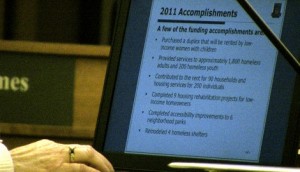Community Development Grants Manager Peggy Sheehan had both good and bad news to impart to Vancouver City Council at its Mar. 5 meeting. Working in conjunction with HOME (Home Investment Partnership Program) and CDBG (Community Development Block Grant) and Program Coordinator Martin Greenlee, she began by outlining all the terrific local projects that federal grants helped finance in 2011.
Among other accomplishments, the $1.8 million in CDBG and HOME funds allowed the City to provide services to approximately 2,000 homeless individuals, complete nine housing rehabilitation projects, remodel four homeless shelters, and make accessibility improvements to six neighborhood parks.The funds also aided struggling Vancouver residents in need of rent assistance and financed the purchase of a duplex designed to shelter low-income women and their children.
In light of these significant and worthwhile achievements, the news that both CDBG and HOME will be reducing their overall support in 2012 becomes all the more distressing. Since 2010, cutbacks to these programs have resulted in a total loss of $617,462 in funding, and this growing deficit is being felt in profound ways.
The effect of shrinking federal grants can be felt most sharply in Vancouver’s public services sector. The total amount of funds currently available for service organizations in 2012 comes to $180,000, while the total amount requested by applicants comes to a whopping $437,000. This $257,000 shortfall means that non-profit community programs such as the Share Hunger Response Program, the Vancouver Police Activities League, and the Clark County Volunteer Lawyers must compete with one another to receive the financial support that they need to operate.
“How do you say no to these (organizations)?” asks Councilmember Jack Burkman. It is a difficult question to answer, but present financial constraints demand a certain amount of prioritization. Unless businesses or other private entities ultimately step forward to help these struggling agencies, some are bound to go underfunded. Over the coming months, the City will be forced place increased emphasis upon critical support, immediate need and fundamental survival in terms of “basic job, basic housing and basic food” services.Of course, the process of whittling down public service programs to include only those that are “most crucial” is subjective in many ways. For example, are the dental procedures that the New Day Community Dental Clinic regularly performs absolutely “essential?” Questions of this type will continue to plague City officials as long as federal grant contributions and alternate financing options continue to dwindle.
Although the outlook can seem bleak, Councilmember Jeanne Harris stresses the power of community involvement and personal political action to affect positive change. She encourages those who have benefited from CDBG and HOME programs to call or email their representatives in Washington DC to tell them just how important this money actually is. “I can go back there and talk all day long about these programs,” she said, “but it really means a lot if it’s coming directly from someone in the community.”











